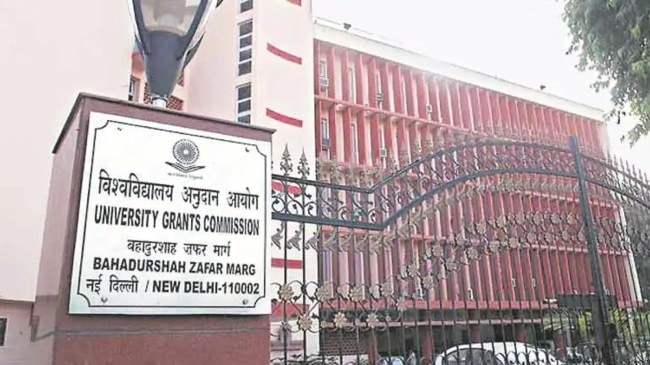Opinion Who selects the university Vice-Chancellor?
Our universities need a versatile leader, not just a teacher. VCs, the most visible symbols of the system are to be appointed strictly per the UGC regulations. Not surprisingly, political expediency and not merit at times decide the choice
 The government plays a crucial role in the appointment of the VCs and the autonomy of the university is given scant regard.
The government plays a crucial role in the appointment of the VCs and the autonomy of the university is given scant regard. “Today, Albert Einstein cannot be appointed as the Vice Chancellor [VC] of any University (at least in India) unless he fulfils the qualifications prescribed by University Grants Commission”, observed Madras High Court in Kalyani Mathivanan (2015). The Indian higher education sector is overregulated and grossly underfunded. The New Education Policy (NEP) and the draft regulations titled “University Grants Commission (Minimum Qualifications for Appointment and Promotion of Teachers and Academic Staff in Universities and Colleges and Measures for Maintenance of Standards in Higher Education) Regulations, 2025” at least promise to bring in flexibility though the tighter governmental control has still been retained.
If Oxford University could appoint John Hood in 2005, who was a businessman and not a distinguished academic, why should Indian universities restrict their choice only to academicians? Our universities need a versatile leader, not just a teacher. VCs, the heads and most visible symbols of the university system are to be appointed strictly in accordance with the UGC regulations. Not surprisingly expediency and not merit at times decide the choice. Congress governments generally preferred left-leaning VCs and current dispensations naturally opt for the other extreme.
The VC as the head of the university is expected to function as a “bridge” between the administrative and the academic wings. The qualifications of VC for the first time were laid down by UGC in 2010. As per the 2018 UGC regulations, the VC should be a “distinguished academician, with a minimum of 10 years of experience as professor in a university system or 10 years of experience in an equivalent position in a reputed research and/or academic administrative organisation”. Most VCs in India are academicians, yet not a single university finds a place in the world’s top 100 universities. We need to make distinguished people of all fields eligible to become VCs.
This is the welcome change that the new UGC regulations have proposed by making non-professors eligible for the coveted post. In addition to professors, any distinguished person at a senior level in industry, public administration, public policy and/or public sector undertakings with a proven track record of significant academic or scholarly contribution would now be eligible.
As a member of some 11 search committees, I faced the huge and difficult task of short-listing candidates for the interaction from the hundreds of applicants. While the idea of inviting applications for such senior positions through newspaper advertisement brings more transparency and to some extent reduces the role of godfathers, it allows all and sundry to apply. The better option is to invite nominations from the current and former VCs, public intellectuals, judges and leading professors. They must be asked to write why they consider a particular person most suitable for that university. They should also give their assessment of the nominee in terms of his leadership qualities, “belief in teamwork”, “pluralism”, and “strong alignment to constitutional values” as these qualities are now part of the prescribed qualifications for the post. One quality that we do not consider important is humility. A good VC should not be arrogant but humble. Unfortunately, humility is an underrated leadership virtue.
True, several commissions had made recommendations on this issue. The Kothari Commission (1964) said that “a vice-chancellor should be a person with vision and (have) qualities of academic leadership with ability for administration. He should command high respect among all sections of the society. The vice-chancellor should be a distinguished academic… (who) has commitment to the values for which the universities stand… He must have the ability to provide leadership to the university by his academic worth, administrative competence and moral stature.” But is such a paragon found only amongst teachers?
Our country has seen some prominent civil servants leading the universities from the front. G Parthasarathy, a diplomat, was a successful VC of Jawaharlal Nehru University. So was K R Narayanan who eventually became the President of India. Former vice-president Mohd Hamid Ansari too was a hugely successful VC of Aligarh Muslim University. In fact, some of AMU’s most successful VCs have been bureaucrats such as Badruddin Tyabji, Syed Hamid, Syed Hashim Ali, Mehmoodur Rehman and Naseem Ahmad. General M A Zaki in Jamia Millia Islamia and General Z U Shah in AMU had good tenures. In civil services, we do have lateral entry now and professors too should be given high administrative positions in the government.
The government plays a crucial role in the appointment of the VCs and the autonomy of the university is given scant regard. VCs in central universities are appointed by the President of India, the ex-officio visitor of all central universities, who generally acts on the advice of the Centre. However, according to the SC judgment in Dr Premachandran Keezhoth (2023), he acts purely as a statutory authority under a particular university Act and not as constitutional head of state. In state universities, appointments are made by the governor rarely on his own except in Opposition-ruled states.
The 1996 Commonwealth Higher Education Management Service (CHEMS) found that in as many as 55 per cent of Asian universities, VCs were appointed by the government. Additionally, in 18 per cent, approval from the government was required after the university selected the VCs. In just one-fifth of cases — 27 per cent — universities had the right to pick their own VCs.
In contrast to Asian countries, universities have been given freedom to choose their VCs in the West. Even in many places in Africa, governments do not have a decisive say. Each university has its own distinctive identity and peculiar problems. Therefore, ideally, universities should be free to choose their own VCs.
The draft regulations fall short of the ideal of giving universities autonomy in selecting their VCs. The proposed three-member search committee has one nominee of the UGC chairman and the other nominee of the chancellor/visitor. The university’s executive council/syndicate etc. will have the right to nominate just one member. Ideally, three nominees should come from the university, one from UGC and the other from the President/Chief Justice as visitor or the Governor as chancellor.
The top-down model is not great. Let us trust our universities and give them a major say in choosing their VCs and let universities be student-centric, not VC-centric.
The writer is vice-chancellor of Chanakya National Law University, Patna. Views are personal





